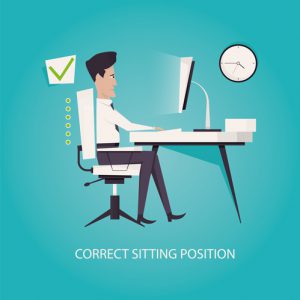14.02.2018
It’s well known that sitting at a desk for prolonged amounts of time can cause health problems for office workers. This can include discomfort or even pain in your back, neck or shoulders. If you’ve had a desk job for a while, you’ve probably felt these effects yourself. The good news is that physiotherapy and musculoskeletal therapies can help prevent back, neck or shoulder pain.
What causes the pain? A number of factors revolving around your workstation could be encouraging you to sit with an incorrect posture. This includes the position and height of your chair and screen, as well as the location of your keyboard and mouse and any other equipment. Making small adjustments can improve your posture and help prevent workstation-related pain. For example:
If you have already made adjustments to your work station and are still experiencing pain, you may want to seek help from a physiotherapist to improve the situation.
LycaHealth Physiotherapy offers rapid access to musculoskeletal specialists at convenient locations in Canary Wharf, London, and Orpington, Kent.

The spine is naturally curved, however, environmental factors, such as repeated and prolonged amounts of time sitting at a desk incorrectly, can lead to spinal deformities. Postural deformities include kyphosis and lordosis, which are exaggerations of the spine’s ‘S’ curve. These deformities can usually be treated with therapy to correct your posture, with surgery only needed in rare cases. However, it’s important that you improve your posture as early as possible to avoid this.
Working a full time desk job can encourage obesity due to the fact that you’re inactive for around eight hours per day, five days per week. Being inactive for this amount of time is thought to slow the metabolism, which can impede the body’s ability to break down body fat. This is in turn potentially harmful to your joints, as excess weight can cause strain.
If you think going to the gym after work is enough to counteract this long period of inactivity, think again. It’s better to break up your day by getting up from your chair and walking around every 30 minutes. Try making yourself regular drinks or taking frequent trips to the water cooler.
Another issue to be weary of is the weakening and wasting away of the muscles, especially in the leg area. Being consistently inactive means you’re not using your muscles as much as you should be, so you’re not building or strengthening them. This can lead to difficulty in range and ease of movement, which you may notice more if you take part in sports or exercise classes such as yoga.
Joint problems can be caused by a shortening of the hip flexors, which can happen when you regularly sit for too long. Your hip flexors are the set of muscles that allow you to bring your knee to your chest and bend at the waist. When you’re not using these muscles enough, they can tighten, causing stiffness and even pain. It’s important to stretch these muscles regularly to ensure that they are kept healthy.
LycaHealth Physiotherapy is accepted by all major insurance companies, and gives rapid access to imaging (MRI, CT scan, X-ray, ultrasound) onsite should you need it.
For more information, or to book an appointment please call: 0207 132 1440 (Canary Wharf) or 01689 490 111 (Orpington) or visit the LycaHealth Physiotherapy website.
Stay up to date
To request information on any of our other services, please call or complete the enquiry form below: